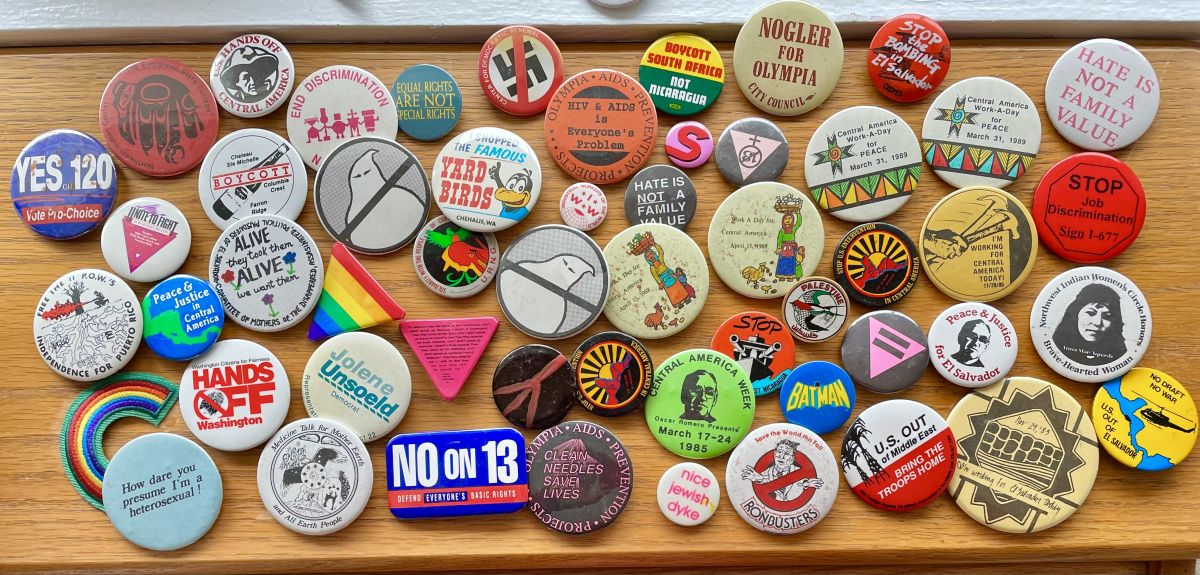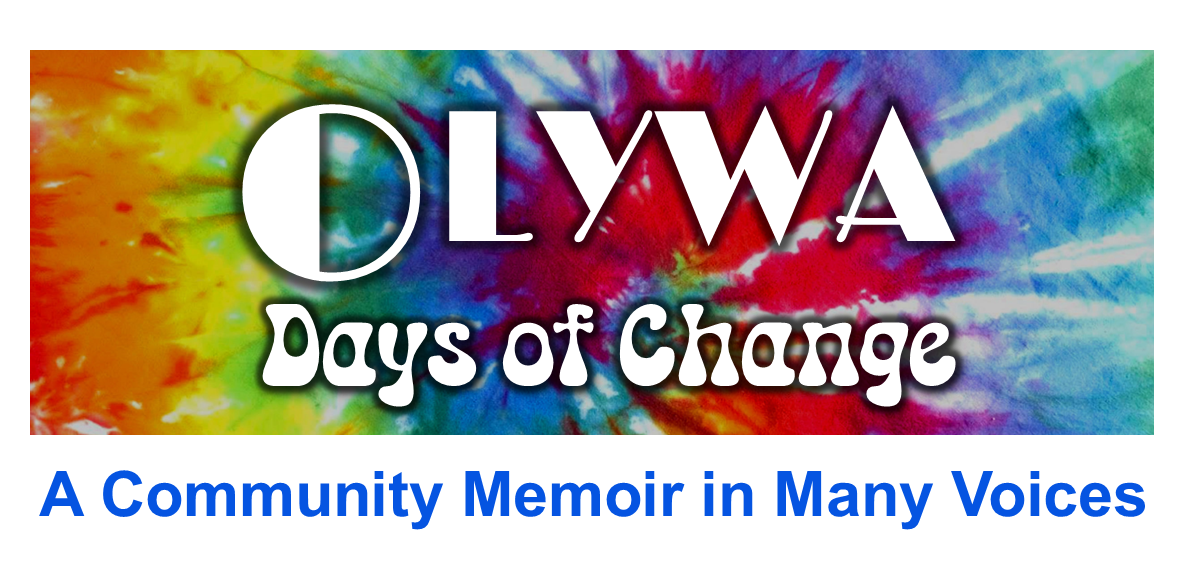- Remembering The Link – By Emily Ray
They say, “What goes around comes around.” Forty years ago, the Daily Olympian (as it was then named) did not serve our community well. The editor-in-chief turned a blind eye to local social and political issues. The newspaper was generally silent on problems and initiatives concerning race relations, gender, growth management, waste reduction, the environment. When the newspaper did glance at any of these issues, it was with a jaundiced eye . . . One of the people who was angry about the newspaper was Margery Sayre.
- Oly Activism in the 1980s – By Ron Jacobs
The biggest protest I recall being involved in with CAAC and CISPES was in fall 1989, during an uptick in the war in El Salvador and after the Salvadoran military had killed six people at a Jesuit home there. Both priests and their housekeepers were brutally murdered. This news intensified the nature of the protest and increased our numbers in front of the federal building on Capitol Way . . . an Evergreen student and I “cased” the building a couple days beforehand, looking for appropriate offices and possible entrance points.
- Funding Social Change Work: the Community Sustaining Fund – By Anna Schlecht
In the 1980s, local activists found the need to go beyond bake sales to create a more reliable form of funding for the many social change projects underway in Olympia. And Paul Cienfuegos had ideas of how to do it . . . How can we raise money collectively and sustainably through our own progressive activist community . . . how could we fund that good work?
- Construction Brigades in Nicaragua During Reagan’s War – By Jean Eberhardt
During the contra war—a right-wing terror campaign waged by ex-national guard mercenaries of Nicaragua’s ousted dictator and funded by the U.S.—over a hundred thousand people from the U.S. visited Nicaragua. Many of us traveled and volunteered with purpose. For example, delegations of elected officials mobilized by progressive organizations, ecumenical study tour groups, long-term volunteers with Witness for Peace, caravans carrying material aid with Pastors for Peace, medical teams, coffee and cotton harvest brigades, and journalists.
- Matrix: the Rise and Fall of Olywa’s Feminist-Lesbian Magazine – By Anna Schlecht
Everything about Matrix started small. We were a grassroots, community-based magazine, written by a handful of local women-identified people and published in a small community printshop with a circulation of less than two hundred. But we quickly realized that we were part of something much larger, and that our work to create and publish it each month followed a powerful tradition of lesbian activism via the printed word.
- Violence and Non-Violence: A Tale of Two Tactics – By Anna Schlecht
Crabshell Alliance was a VERY different kind of political action group for me. Up until 1975, my political experience had involved bouncing around the antiwar movement in Madison, Wisconsin, most of which was DIY, male-dominated, and raucous. But in Crabshell Alliance, I found myself part of a well-organized effort with clear strategies, effective tactics, and women in leadership. Vastly different.
- Cracks in the Foundation for WPPSS – By Tom Clingman
So Jim dug out the per-customer debt projections for each PUD and electrical co-op. We got a list of all the newspapers in the state. We created a “letter to the editor” form letter, inserted the PUD/co-op name and the per-customer debt figure, and sent it off to the newspaper nearest to each utility. An early crack in the WPPSS nuclear power edifice came at a WPPSS meeting. Someone from a rural electrical co-op stood up, waving around a letter to the editor that showed the massive debt load for each of their members, and expressed grave concerns about the WPPSS nuclear power plan.
- Fair Electric Rates Now: A David v. Goliath Saga – By Tom Clingman
I remember the initial 1978 meeting of the group that became FERN (Fair Electric Rates Now). We had reserved a meeting room at the old Olympia Community Center for a gathering of folks concerned about Puget Power’s investments in nuclear power, and the potential Puget Power rate impacts. The rhythm of kids playing basketball on the nearby courts accompanied our discussion.
- Blossom Patches – By Pat Holm
Around 1970, Steve Wilcox and a group of friends decided to lobby for the legalization of marijuana. We formed an organization called BLOSSOM: Basic Liberation Of Smokers and Sympathizers Of Marijuana. I was the sympathizer since I didn’t smoke pot and nobody was doing edibles yet, except for the occasional fibrous brownies. We wrote up a list of ideas, goals, and tasks, and we assessed what each of us could contribute to the effort.
- The First Lesbian Community Meetings – By Anna Schlecht
We stood there befuddled on Columbia Street until other women began to arrive for the meeting. Many had come pumped up to argue about who should be invited, but once they heard what had happened, most of the divisions fell away. Suddenly, everyone there had the shared experience of being discriminated against as queers, whether they publicly identified that way or not. Nearly 50 women found themselves standing sullenly on the dark street with nowhere to go.
- Supporting the Teachers’ Union in El Salvador – 1985 – By Steven Kant
I was traveling with a delegation of U.S. teachers and union activists. The trip included people from Seattle, Los Angeles, and other U.S. cities. Beth Harris of Olympia was one of the organizers. We were responding to a request from ANDES, the Salvadoran teachers union, to attend their union convention. ANDES had not been able to hold a convention for years because of the violent repression, so they invited teachers and activists from all over the world to attend as witnesses and participants.
- Our Experiences at the Evergreen Labor Center – Lee, Shortt-Sanchez, Gilman
We are all longtime Olympia folks and three of many who learned and organized at the Labor Center with Dan Leahy. We did not differentiate between our work at The Evergreen State College Labor Education Center and our working-class roots. We each tell about our involvement with the Labor Center and how it affected our lives. Dan Leahy passed away in 2022.
- EPIC Action During US Air Force Band Performance – 1972
Using a PA system, we announced that we would be showing a slideshow to reveal the actual military purpose of the air force in Southeast Asia, noting that we were not attacking the individual band members, but rather bringing attention to bear on the actual role of the air force itself, especially in Vietnam, Laos, and Cambodia.
- The Communist Party in 1970s Olympia – Ann Vandeman – By Bethany Weidner
“The Party people were the only ones who consistently linked race and class and I was attracted to that. Those people and their ideas helped me answer big questions I had at that age: why aren’t people nicer and what about fairness? I found them sympathetic because their values were consistent with the ones I had come to.”
- Antiwar Action: Collecting Donations at Yard Bird’s
Our action at Yard Bird’s was inspired by a project of the American Friends Service Committee. The aim was to educate people about the nature of the Vietnam War. We publicly solicited donations to help rebuild a sweater factory destroyed by US bombings in northern Vietnam (Democratic Republic of Vietnam).
- Recollections on the Founding of the Gay Resource Center – By Don Orr Martin
The first phone call I took (that wasn’t a crank call) was from a lesbian in Lacey. It was 1973 and I was the founder and sole staff person answering the phone at the Gay Resource Center, a new student group at Evergreen. She and her partner had both been divorced from men, and between them they had five kids living in a double wide trailer. She wanted to know if I could offer them any help regarding child custody issues.
- A Small Town’s Sex-Positive Response to AIDS – By Don Orr Martin
I worked in public health at the height of the AIDS pandemic. Powerful Republican congressmen and President Reagan’s agency heads put in place serious limits on what federally-funded educational programs could say about safe sex. Federal laws required that all the materials we produced about condom use and HIV testing had to include the message that the only ways to prevent AIDS or other sexually transmitted infections were by: 1) Abstinence; or 2) Fidelity in a heterosexual marriage. These were not messages that resonated with the men in the woods by the railroad tracks.
- Don’t Cry for Me Miami – 1978 – By Don Orr Martin
Anita Bryant was an also-ran Miss America contestant in 1959 (Miss Oklahoma) and a christian pop singer who became a spokesperson for the lucrative Florida citrus industry. She popularized their slogans. “A day without orange juice is like a day without sunshine.”
Anita was also a rabid homophobe and a lightning rod in the thunderhead of anti-LGBT politics of the late 1970s. Anita Bryant was a piece of work.
- From Here to El Salvador – By Beth Hartmann
At home that night, the war was present in my mind and my dreams, the images and stories haunting me. I wasn’t the only one. We were soon meeting and talking about how to organize in support of the poor of El Salvador and confront the policies of our own government that perpetuated rampant abuses. No one envisioned an antiwar movement like we had with the Vietnamese War. This was a tiny country and U.S. involvement was hidden and more subtle than boots on the ground, though there were boots on the ground in some cases.
- Women’s Shelter Task Force – 1975 – By Susan Davenport
In 1975, one of the social spots for young adults and students was, oddly, the local Crisis Clinic. Many Evergreen and Saint Martin’s students who were looking for ways to connect in the Olympia community volunteered there. Word of mouth got around that they offered exceptional training in communication skills, crisis intervention, suicide prevention, and de-escalation of acute mental health episodes, along with expansive knowledge about local agencies, resources, contact numbers, and their eligibility criteria. This was a treasure trove for students in sociology and psychology studies and those interested in internships or social-issue policy work.
- Glen Anderson Tribute – By Anna Schlecht
Glen Anderson was a lifelong activist, never wavering in his dedication to promoting peace on all fronts. He remained a steady proponent of nonviolence in local activism. We are fortunate to have called him our friend and fellow activist. May his memory be an inspiration to continue to stand up for social justice.
- Gay Nights at the Conestoga! – By Anna Schlecht and Alexis Jetter
After a few minutes, though, the tone changed, and the music stopped. The owner, who was at the club that night, cut us off from the bar and ordered us to leave, telling us that we’d be arrested if we returned. We were shocked—as were several people at the bar, who looked at us with a mixture of curiosity and discomfort. We refused to budge from the dance floor and demanded an explanation. The owner said he had the right to refuse service to anyone he pleased. “If you let certain types or elements, take over a place,” he later told the Daily Olympian, “you’re going to be hurting.”

